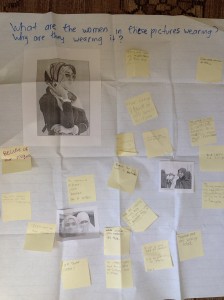Now more than ever, in this era of Muslim bans and large scale deportations of undocumented immigrants, I have been feeling like I need to do something concrete to intercept bias and hatred. Signing petitions, marching for women’s rights, donating to immigrant rights organizations — many of us are doing these things already.
But we need to consider ALL the strategies we each have available to promote justice and respect. We each have unique opportunities, different strategies, depending on our experience and position in life, and we can use our sense of agency to leverage those opportunities.
For example, as an educator, I can reach my students and hopefully make a positive difference in their lives. And as a filmmaker, I also have the opportunity to share the stories and experiences of the women in “Just a Piece of Cloth”. I have found that the most powerful changes take place through dialogue before and after the film as people share with one another — what affected them in the film, how they see things differently afterwards, and what they plan to do with that change in perception. The film is a trigger that helps us to explore deeper connections with one another, as well as consider how we act in the world to promote respect and justice.

